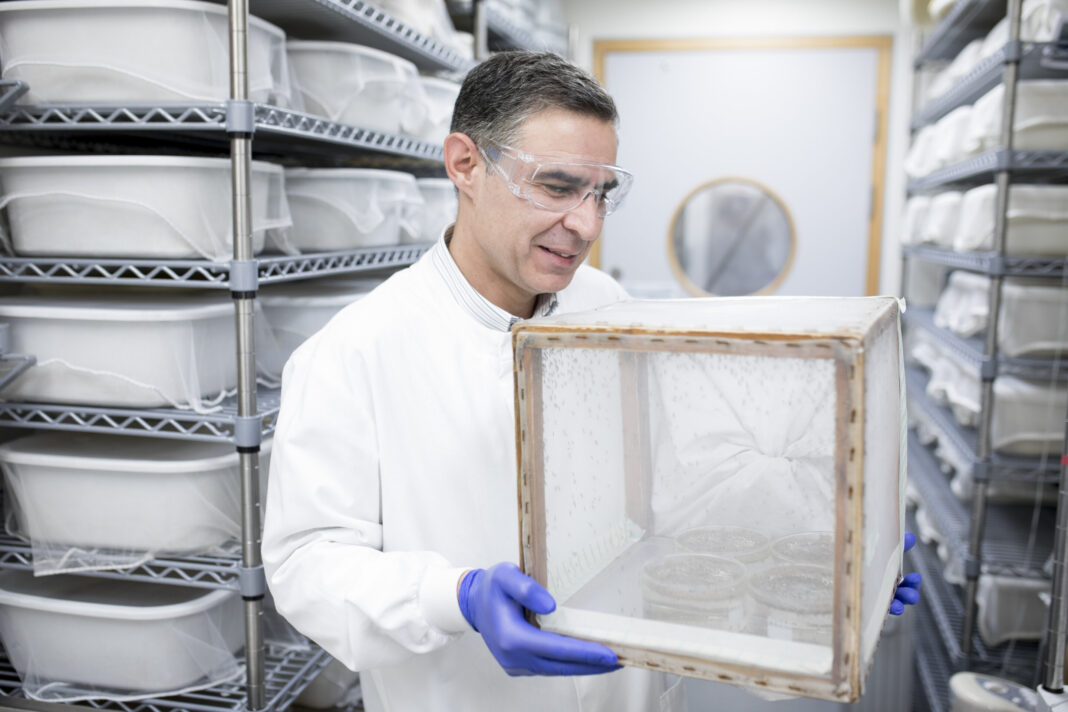Scientists have engineered mosquitoes that slow the growth of malaria-causing parasites in their gut, preventing transmission of the disease to humans.
The genetic modification causes mosquitoes to produce compounds in their guts that stunt the growth of parasites, meaning they are unlikely to reach the mosquitoes’ salivary glands and be passed on in a bite before the insects die.
So far, the technique has been shown to dramatically reduce the possibility of malaria spread in a lab setting, but if proven safe and effective in real-world settings it could offer a powerful new tool to help eliminate malaria.
The innovation, by researchers from the Transmission:Zero team at Imperial College London, is designed so it can be coupled with existing “gene drive” technology to spread the modification and drastically cut malaria transmission. The team is looking toward field trials, but will thoroughly test the safety of the new modification before combining it with a gene drive for real-world tests.
Collaborators from the Institute for Disease Modeling at the Bill and Melinda Gates Foundation also developed a model that, for the first time, can assess the impact of such modifications if used in a variety of African settings. They found that the modification developed by the Transmission:Zero team could be a powerful tool for bringing down cases of malaria even where transmission is high.
The results of the modification technology in the lab and the modeling are published today in Science Advances.
Malaria remains one of the world’s most devastating diseases, putting at risk about half of the world’s population. In 2021 alone, it infected 241 million and killed 627,000 people, mostly children aged below five years old in sub-Saharan Africa.
Co-first author of the study Dr. Tibebu Habtewold, from the Department of Life Sciences at Imperial, says that “since 2015, the progress in tackling malaria has stalled. Mosquitoes and the parasites they carry are becoming resistant to available interventions such as insecticides and treatments, and funding has plateaued. We need to develop innovative new tools.”
The disease is transmitted between people after a female mosquito bites someone infected with the malaria parasite. The parasite then develops into its next stage in the mosquito’s gut and travels to its salivary glands, ready to infect the next person the mosquito bites.
However, only around 10% of mosquitoes live long enough for the parasite to develop far enough to be infectious. The team aimed to lengthen the odds even further, by extending the time it takes for the parasite to develop in the gut.
The Transmission:Zero team genetically modified the main malaria-carrying species of mosquito in sub-Saharan Africa: Anopheles gambiae. They were able to make it so that when a mosquito takes a blood meal, it produces two molecules called antimicrobial peptides in its guts. These peptides, which were originally isolated from honeybees and African clawed frogs, impair the malaria parasite’s development.
This caused a few days’ delay before the next parasite stage could reach the mosquito salivary glands, by which time most mosquitoes in nature are expected to die. The peptides work by interfering with the energy metabolism of the parasite, which has some effect on the mosquito, causing them to have a shorter lifespan and further decreasing their ability to pass on the parasite.
Co-first author of the study Astrid Hoermann, from the Department of Life Sciences at Imperial, says that “for many years, we have been trying to no avail to make mosquitoes that cannot be infected by the parasite or ones that can clear all the parasites with their immune system. Delaying parasites’ development inside the mosquito is a conceptual shift that has opened many more opportunities to block malaria transmission from mosquitoes to humans.”
To use the genetic modification to prevent malaria spread in the real world, it needs to be spread from lab-bred mosquitoes to wild ones. Normal interbreeding would spread it to a certain degree, but because the modification has a ‘fitness cost’ in the form of reduced lifespan, it would likely be quickly eliminated thanks to natural selection.
Gene drive is an additional genetic trick that can be added to mosquitoes that would cause the anti-parasite genetic modification to be preferentially inherited, making it spread more widely among any natural populations.
Because this strategy is so new, it would require extremely careful planning to minimize risks before any field trials. The Transmission:Zero team is therefore creating two separate but compatible strains of modified mosquitoes – one with the anti-parasite modification and one with the gene drive.
They can then test the anti-parasite modification on its own first, only adding in the gene drive once it has been shown to be effective.
https://phys.org/news/2022-09-scientists-mosquitoes-malaria.html


